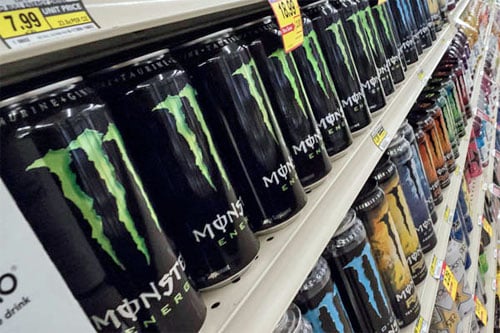The marketing slogan that we’ve all heard by now for the popular energy drink, Red Bull, is that “Red Bull gives you wings.”
However, if you’re not careful, Red Bull may be more likely to give you a gut instead. For the regular version of Red Bull, it contains 27 grams of sugar which are similar to traditional carbonated beverages. Consuming one or more cans of Red Bull per day will increase your caloric intake of simple sugars which can contribute to obesity and weight gain.
A recent article published in the journal, The Physician and Sportsmedicine, reviewed the evidence for two purported uses of energy drinks including improving athletic performance and promoting weight loss (Ballard et al, 2010).

Common Ingredients
- taurine
- caffeine
- sucrose
- guarana
- ginseng
- niacin
- pyridoxine
- cyanocobalamin
Most Popular ‘Energy Drinks’
- Red Bull
- Monster
- Rockstar
- AMP
- Full Throttle
 Does Red Bull Give You Wings?
Does Red Bull Give You Wings?
Red Bull is probably the most extensively studied energy drink currently on the market. Research on potential performance-enhancing effects have included the following results:
- Improved reaction time, aerobic and anaerobic performance (Alford et al).
- Increased upper body endurance, but no effect on anaerobic performance (Forbes et al).
- Improved 1 hour of cycling at 70% maximal workload (Ivy et al).
Of note, there have been some inconsistencies in the study results. Overall, the potential performance-enhancing effects of Red Bull compared to a carbonated placebo beverage were not terribly impressive.
Energy Drinks and Weight loss?
Most energy drinks make the claim that they stimulate metabolism. One exception is the energy drink, Celsius, which is aggressively marketed for promoting weight loss.
Does Celsius promote weight loss?
As noted in the Ballard article, Celsius, Inc, funded a series of three studies at the University of Oklahoma which is the basis for their claims (5-7).
From the study published by Roberts et al, 2008, over a 28 day period:
- Participants in the Celsius group showed a trend toward decreased body fat percentage (BF%) from 25.6% on day 0 to 25.4% on day 28 (P = 0.09) while Body fat% increased in the placebo group from 25.1% to 25.9% (P = 0.13).
- Fat mass decreased from 18.9 to 18.3 kg for the Celsius group (P < 0.05) with an increase in the placebo group from 18.1 to 18.4 kg.
Personally, I still feel that weight loss particularly sustained weight loss is best achieved by healthy dietary changes when combined with exercise. As well, I would probably like to see additional research to confirm the findings regarding Celsius’ marketing claims of “Burn up to 100 calories and more in each can.”
Possible Side Effects (Ballard et al, 2010):
With the increasing popularity of energy drinks, it’s important to be cognizant of the potential adverse effects associated with their consumption.
- Cases of seizures have been reported.
- Psychiatric sequelae have been reported by patients with known psychiatric illness.
- Cardiovascular side effects:
- increased heart rate
- blood pressure
- cardiac arrest
- supraventricular tachycardia.
- Stroke – rare, but very serious.
- Dental enamel erosion from the acidity of energy drinks
- Obviously, another common concern with energy drinks is that young adults often mix them with alcohol, particularly in large quantities.
The main ingredients found commonly in energy drinks that warrant concern–especially in combination is a large amount of caffeine combined with guarana (which contains caffeine, theobromine, and theophylline) as well as taurine, an intracellular amino acid. As well, energy drinks often contain sugar in quantities that exceed the recommended daily amount.
References:
- Ballard SL, Wellborn-Kim JJ, Clauson KA. Effects of commercial energy drink consumption on athletic performance and body composition. Phys Sportsmed. 2010 Apr;38(1):107-17.
- Alford C, Cox H, Wescott R. The effects of red bull energy drink on human performance and mood. Amino Acids. 2001;21(2):139–150.
- Forbes SC, Candow DG, Little JP, Magnus C, Chilibeck PD. Effect of Red Bull energy drink on repeated Wingate cycle performance and bench-press muscle endurance. Int J Sport Nutr Exerc Metab. 2007;17(5):433–444.
- Ivy JL, Kammer L, Ding Z, et al. Improved cycling time-trial performance after ingestion of a caffeine energy drink. Int J Sport Nutr Exerc Metab. 2009;19(1):61–78.
- Lockwood CM, Moon JR, Smith AE, et al. Low-calorie energy drink improves physiological response to exercise in previously sedentary men: a placebo-controlled efficacy and safety study [published online ahead of print October 7, 2009]. J Strength Cond Res.
- Dalbo VJ, Roberts MD, Stout JR, Kerksick CM. Acute effects of ingesting a commercial thermogenic drink on changes in energy expenditure and markers of lipolysis. J Int Soc Sport Nutr. 2008;5:6.
- Roberts MD, Dalbo VJ, Hassell SE, Stout JR, Kerksick CM. Efficacy and safety of a popular thermogenic drink after 28 days of ingestion. J Int Soc Sports Nutr. 2008;5:19.





